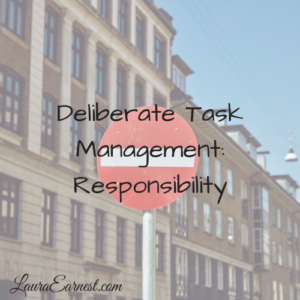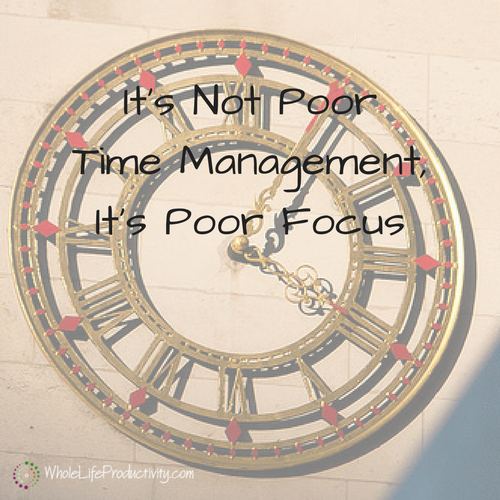
Deliberate Task Management: Responsibility
One of the things about living a more deliberate life is that it means I have to take full responsibility for my decisions. It has been brought home to me that what I do is a choice, which requires a decision, and this has led me to consider more of what I am doing – and not doing – at any time.
2 Warnings
Sadly, this was emphasized to me in two separate interactions earlier this month. And since I’ve heard it said that “if you can’t be a good example, you could be a horrible warning”, I am taking these as warnings.
In the first, a young person I work with blames all of her problems on her parents. Everything she feels is wrong with her life – from her stress level to her extended study hours to her depressive episodes – are her parents’ fault. The thing is that I know her parents well, and other than their rule that she cannot participate in extracurricular activities if her grades drop below Cs, there are no other pressures. In fact, her mother would much prefer that her daughter not study until 1 every morning and then run on 4 hours of sleep. It is the girl’s drive that she can’t accept less than 100% on anything that is causing the majority of her issues.
The other situation was a man who is almost 60. He blames everything that has happened to him in his life on his parents. From being stuck in a dead-end job to three failed marriages to alienated children – these are all his parents’ fault. His parents have been dead since he was in his 20s.
Blame And Excuses
There was a time when I also blamed others for my lack of living up to my ideals, so I really get where this is coming from. I’ll even go so far as to say that it was the mindset I was raised with, and it’s taken me a lot of hard work to break free of this and realize that my choices, and the consequences are my own.
My husband has a good, but rather direct, saying about excuses that he got from his master chief: “Excuses are like butts. Everyone has one and they all stink.” (I’ve cleaned up the Navy talk for this blog. You can read between the lines.)
So what do blame and excuses do to help me live a more deliberate and productive life?
Nothing.
So how can you remove blame and excuses from your life? Read on.
Writing Down My Excuses
Cal Newport, in his book How to Become a Straight-A Student: The Unconventional Strategies Real College Students Use to Score High While Studying Less has a brief section on time management. He advocates for under-planning tasks, and then throws in a twist: if you don’t get everything done, you need to write down your excuses. He says that you will recognize the excuses for what they are.
Excuses are something I did, or caused to happen, that keep me from being productive.
As part of learning to right-size my task lists, I have also begun to include my excuses for not getting them done. It’s a rather shocking exercise.
A recent entry read: I chose to eat candy which made me sleepy so I laid down for a nap and lost three hours.
Ouch.
Any time I am tempted to blame or use excuses, I write it down. Every night I have to account for why I haven’t gotten my list complete. If I commit to being really honest with myself, I will see them for what they are. And the picture isn’t pretty.
Getting Past Crap Rationalizations
Alpha Efficiency defines a crap rationalization as “a barrier to getting stuff done that only exists in my mind.”
These are harder to spot than my excuses, because they are more about what is in my head than the result of direct actions or choices.
“I can’t start on getting my car repaired because I don’t have the number.” “I have the number, but I can’t take time to make the phone call because I’m busy.”
“I can’t write the book because I don’t know what to write.” “I don’t like the topics I brainstormed, so I can’t outline.” “I can’t brainstorm more topics because what’s the point? I didn’t like the last batch.”
The truth is I’m not too busy to make a ten minute phone call…maybe I could do that instead of looking at Instagram. And a single batch of brainstorming isn’t all the ideas that are possible. I can look elsewhere.
I am usually falling victim to crap rationalization when tasks linger on my lists. I review these at the end of the day, too, and make sure that I am doing what I can.
Looking At The Consequences
As long as I’m talking about excuses and rationalizations, I need to mention consequences. I’m not just talking about things where if you put your hand on a hot stove you’ll be burned. I’m talking about the things that don’t happen because of my choices.
It’s easy to see the consequences of the crap rationalizations: things don’t get done. My car is still not fixed because I haven’t made the phone call. I still haven’t started on the non-fiction book, even though I planned to write that during this year’s NaNoWriMo.
But the excuses lead to other things. On the day that I didn’t mind my diet and ended up napping…well, that led to lack of sleep that night, which in turn led to poor productivity the next day as I struggled to stay awake.
Some of my choices have consequences beyond not getting my tasks done. They can put me behind schedule to the point where the rock of tasks rolls over me and flattens me.
Conclusion
Recognizing excuses and crap rationalizations has allowed me to take responsibility in managing my tasks. I see, with very few exceptions, that my completion rate is really dependent on what I choose to do at any given point, regardless of what is going on around me.
Photo by Andersen Jensen on Unsplash




